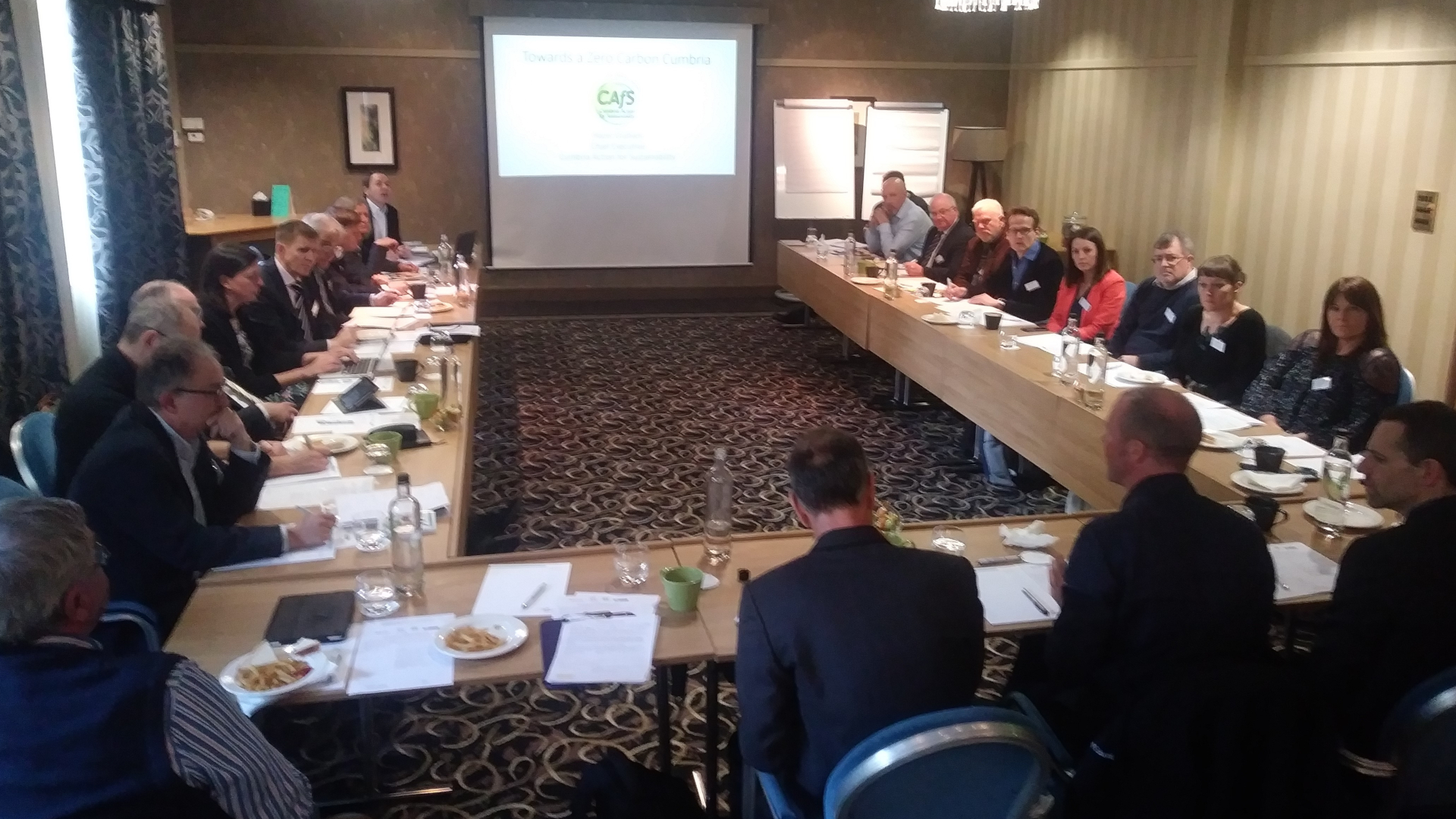Senior leaders from key organisations in Cumbria have met at the county’s first leaders’ summit on climate change, to plan how they can play their part in tackling climate change.
The 27 CEOs and chairs from businesses, local authorities and the voluntary sector acknowledged climate change as a key issue demanding urgent action. They outlined their organisations’ ambitions and high-level targets for reducing carbon emissions, and agreed to develop a coordinated Cumbria-wide approach.
“There was a phenomenal response to the summit,” said Hazel Graham, chief executive of CAfS, who organised and chaired the event on behalf of the Lake District National Park Partnership, sponsored by Electricity North West and South Lakeland District Council.
“There was a fantastic buzz in the room and a real sense of Cumbria being re-energised about climate change. It was particularly heartening to hear that a dozen or so of the organisations already have strong targets and ambitions for their operations to be zero carbon by timescales ranging from 2030 to 2050. There was a great deal of ambition to use their networks to influence others. Others had ambitious project ideas.”
The leaders had inspiration from speakers including Richard Leafe, chief executive of the Lake District National Park Authority (LDNPA); CAfS trustee Mike Berners-Lee, climate change author, professor at Lancaster University and founder of Small World Consulting; the LDNPA’s climate advisor, Dr Becky Willis; the leaders of the two Cumbrian councils that have declared a climate emergency (councilors Colin Glover, Carlisle City Council, and Giles Archibald, South Lakeland District Council), Steve Cox, engineering and technical director at Electricity North West; and Mark Cropper, chair of James Cropper and managing director at Ellergreen Hydro.
“CAfS stressed the need to work collectively, aim high, work fast and start now,” Hazel said. “We proposed that we all commit to reducing our own organisation’s emissions to zero by 2030, and to a large-scale partnership approach, aiming to decarbonise Cumbria within the same timescale. We must truly understand emissions in the county and reduce them in a strategic way. Given the energy and expertise we had in the room, we can aim to be the UK’s first carbon neutral county.”
Hazel added: “The next step is for us to begin developing a partnership bid to take forward large ‘economies of scale’ projects and an audit of Cumbria’s current carbon emissions. Every tonne of carbon emitted takes us closer to tipping points and costs lives.
“We know that we have the technology and solutions we need to get to zero carbon by 2030, but what we need now is ambition, leadership and rapid, meaningful action and that’s why this leaders’ summit was so crucial. We need to pull our actions together at a county level and build the economy of scale we need to make the level of change required, because it will not be easy.”
Low Carbon Lake District celebrates 10th anniversary
The leaders’ summit was followed by a wider celebration of the tenth anniversary of the Low Carbon Lake District initiative, also organised by CAfS on behalf of the Lake District National Park Partnership, and sponsored by Electricity North West and South Lakeland District Council.
The room was packed as a wide range of organisations and community groups from across the county came to hear about what’s been achieved and the challenges ahead.
Richard Leafe introduced the event and reported on progress so far. Delegates then heard about the national context of climate impacts and adaptation from UK Commissioner for the Global Commission on Climate Change Adaptation, Emma Howard Boyd, who is chair of the Environment Agency.
Paul Allen, director of the Centre for Alternative Technology and coordinator for Zero Carbon Britain outlined how a rapid transition to zero carbon is not only technically feasible, but brings a wealth of co-benefits.
Dr Becky Willis and Mike Berners-Lee, mapped out a decade of progress in the Lake District on carbon reduction and discussed local priorities and opportunities. Hazel outlined inspirational projects and activity across the county and shared the high level of ambition expressed at the leaders’ summit.
Delegates enthusiastically took part in a ‘postcards from the future’ interactive exercise, to develop a vision for a zero carbon Cumbria and the role they could each play in it.
Can we become the first carbon neutral county? Could your organisation contribute something to making this transition?

